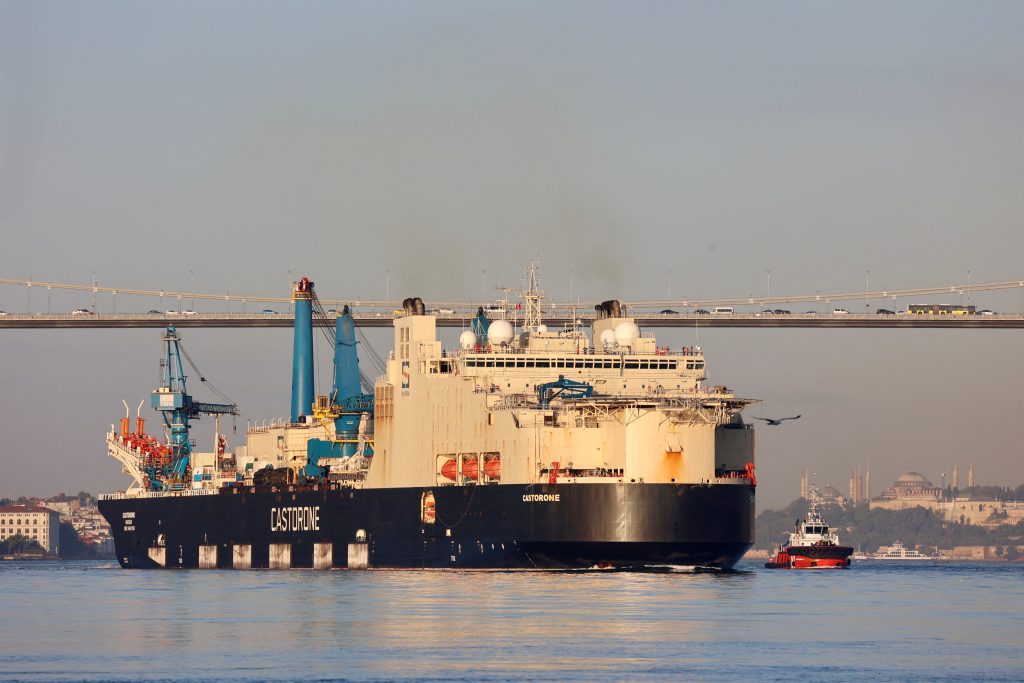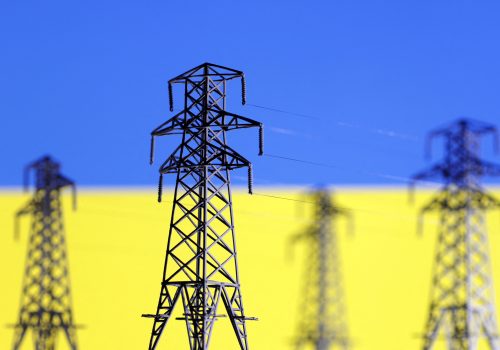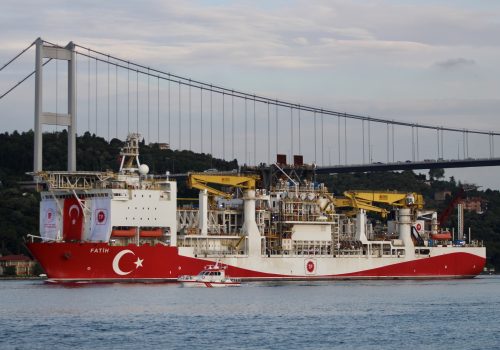Last month, energy companies Petrom and Romgaz announced plans to develop Romania’s Neptun Deep offshore gas field. The development of the field is a good sign for the wider Black Sea’s energy security—and has the potential to impact the region geopolitically and economically, notably by providing an alternative to Russian gas, thereby weakening Moscow’s influence.
Much of the Black Sea has been off limits for oil and gas production mostly because of geopolitical tensions, the sea’s exceptional depths, and environmental and worker safety concerns. Prior to 2014, sizeable natural gas fields existed in Ukraine’s Black Sea exclusive economic zone (EEZ); however, when Russia annexed Crimea, it appropriated Ukraine’s gas deposits, effectively removing these assets and potential revenues for the foreseeable future.
In recent years, Turkey and Romania have emerged as players in the region’s gas projects. For example, in August 2020, the state-owned Turkish Petroleum Corporation discovered the Sakarya gas field, the largest in the western Black Sea. Estimates indicate that Sakarya holds 540 billion cubic meters (bcm) of gas reserves and it will meet roughly 30 percent of Turkey’s natural gas demand. The first deliveries of gas are anticipated in 2023.
Romania has also discovered significant offshore gas reserves in its EEZ and plans to exploit about 200 bcm. Romania started doing so in 2023, producing 1 bcm from the Ana platform, a field developed by Black Sea Oil & Gas. However, the largest field in the Romanian sector is Neptun Deep, estimated at 100 bcm, in water depths between 100-1,700 meters.
OMV Petrom (a Romanian oil and gas company owned by Austria’s OMV) and Romgaz (a Romanian state-owned gas company) will lead the development of the project. Infrastructure development will start in 2024, and first production is expected in early 2027. According to George Scutaru, director of the New Strategy Center (a Romanian think tank) and former national security advisor to the Romanian president, Neptun Deep will produce between 7 bcm and 8 bcm per year, with potential revenues of over twenty-five billion dollars—the equivalent of three and a half years of Bucharest’s current defense expenditures.
While many Black Sea countries are dependent on Russian gas imports, Romania meets roughly 80 percent of its gas consumption from domestic production. Neptun Deep and Ana, combined with existing production, will satisfy Romania’s annual consumption of about 12 bcm if all goes as planned. Once its Black Sea production comes online, Romania could export excess product to its neighbors, thereby substituting for their imports of Russian gas. Romania has already taken steps to supplant Moldova’s gas imports from Russia, yet there is the potential for Black Sea gas to alleviate much of the regional dependence on TurkStream, the undersea pipeline that supplies Russian gas to many Eastern European countries. For comparison, Moldova’s annual gas consumption is 2.9 bcm, Bulgaria’s is 3 bcm, and Serbia’s is 2.4 bcm. (Of Moldova’s 2.9 bcm, Romania will only supply 1.5 bcm for the territory controlled by Chisinau, according to Scutaro, while the remaining 1.4 bcm consumed by the Kremlin-controlled breakaway territory of Transnistria will be supplied by Russia.) Improving relations between Romania and Hungary could also be a factor in lessening Budapest’s reliance on Russian gas giant Gazprom.
It is expected that Russia will oppose these natural gas projects, seeing as the Kremlin has already demonstrated a range of hybrid warfare tactics in the Black Sea.
That deliberate, obstructive, and hostile behavior—which has the potential to gravely impact gas production and regional stability—takes many forms. One such form is Moscow’s seizure of Ukrainian offshore oil and gas wells immediately following its annexation of Crimea in 2014. Russia has also taken actions in the Black Sea that endanger navigation and inhibit freedom of movement. For instance, Russia is accused of launching a mass GPS spoofing attack in June 2017; the attack clouded navigation for Black Sea shipping and prompted a warning from the NATO Shipping Center. Moscow is also accused of blocking large segments of the Black Sea by declaring fictitious or running real naval exercises.
More recently, Russia has been accused of deliberately delaying the inspection of ships related to the United Nations-negotiated grain shipment deal, which allowed Ukraine to export critically needed food supplies to developing countries; the Kremlin pulled out of the deal last week. On February 10, 2023, a Russian kamikaze drone boat attacked the Zatoka Bridge over the Dniester estuary. This bridge is a critical railway link between Odesa (Ukraine’s only major seaport) and Romania’s port at Galati. Sea mines, sown by both sides in the prosecution of the war, have also become major hazards.
Because of Russia’s seizures in 2014, Romania’s EEZ border de facto abuts the Russian EEZ. Additionally, Romania’s location and relative naval weakness make it arguably more susceptible than Turkey to Russian interference. Whether offshore gas facilities located in the EEZ benefit from NATO Article 5 or Article 6 protection is debatable, so there is the potential for much mischief from the Kremlin.
Romania’s decision to begin exploiting Neptun Deep prompted speculation that Bucharest could join Ankara in leading a regional energy renaissance. However, both countries are presented with a blessing and a curse. Military, political, and economic pressure from Moscow will be intense, with the potential for even greater regional destabilization. Conversely, this natural gas project opens opportunities not only for reaping large windfalls and supporting regional energy security, but also for cooperation between these two NATO members. More specifically, this could entail greater multi-domain cooperation between the countries, leading to higher resilience, capabilities, and interoperability, while leveraging the Alliance’s broad support infrastructure.
In its summit communiqué this month, NATO acknowledged the Black Sea’s strategic value as well as Russia’s potential use of hybrid tactics to undermine regional allies and partners. NATO, with US leadership, must maintain a credible deterrent to Moscow’s actions in the Black Sea. At a minimum, the West must continue to support regional allies and partners by demonstrating solidarity against Russian aggression and promoting regional energy security through source diversification. This can only be accomplished through domestic energy production of both fossil fuels and renewables. More specifically, these actions need to be coupled with developing greater military operational capability through a combination of modern weapons acquisition and joint exercises. Romania has the potential to propel these efforts further with its Neptun Deep project; other NATO allies must follow suit by increasing their contributions to a credible deterrent.
Arnold C. Dupuy is a nonresident senior fellow at the Atlantic Council IN TURKEY, a faculty member of the US Naval Postgraduate School, and chair of the NATO Science and Technology Organization’s SAS-183, “Energy Security Capabilities, Resilience and Interoperability.”
Further reading
Fri, May 5, 2023
To secure the Black Sea, the West must help Moldova stand up to Russian aggression
TURKEYSource By Arnold C. Dupuy
Moldova is working on orienting itself more closely with the West, but it needs support to fend off Russian pressure and attempts to gain influence.
Wed, Jan 4, 2023
How NATO can keep pace with hybrid threats in the Black Sea region and beyond
TURKEYSource By Arnold C. Dupuy
Russia's targeting of civilian infrastructure in Ukraine reveals the vulnerability of energy systems to hybrid threats, warranting study and research to mitigate the risks.
Wed, Dec 7, 2022
Turkey can become an energy hub—but not by going all-in on Russian gas
TURKEYSource By Yevgeniya Gaber
Turkey has the ambition and potential to play a key role in the regional energy landscape but Russian gas hampers its effort to become a hub.
Image: Saipem's pipelay vessel Castorone sails in the Bosphorus on its way to the Black Sea, in Istanbul, Turkey July 5, 2022. REUTERS/Yoruk Isik



